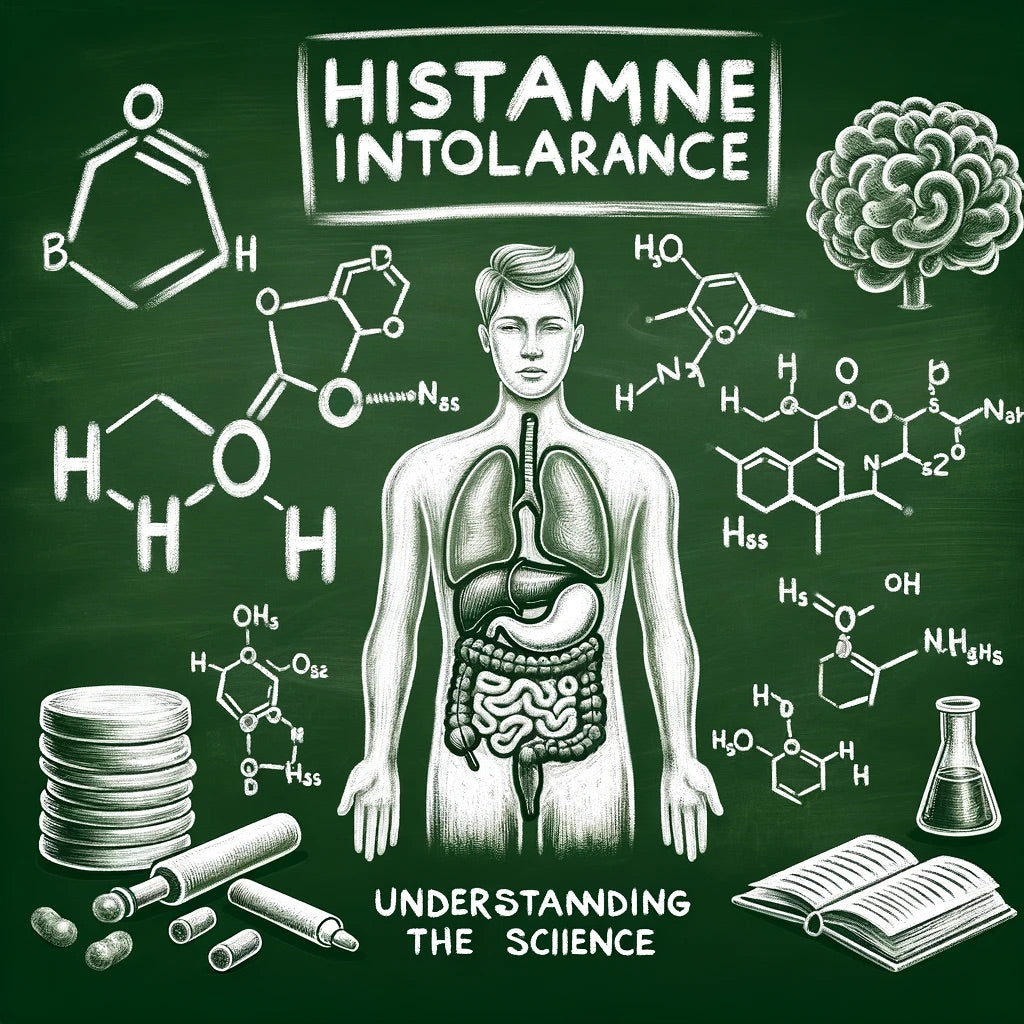
Understanding Histamine Intolerance: Q&A Guide
Share
As we see with many modern day diagnoses, the root cause of histamine intolerance can be addressed through diet and lifestyle changes, and truly these changes are the only way to treat the root cause of this bodily imbalance. If you think you may be affected by this intolerance, we recommend consulting your holistic healthcare provider or functional medicine doctor in order to fully address the issue in concert with any other protocols that may be specific to you and your health status.
What is histamine?
Histamine is an amino acid in the body that mediates allergic reactions like those that occur with seasonal allergies or food allergies. Allergic reactions are largely thought to be an overreaction of the immune system to harmless substances, like pollen or food. But histamine intolerance is not the same as an allergic reaction.
What is histamine intolerance?
Histamine intolerance is a multifactorial issue where the body has trouble breaking down histamine, leading to elevated levels of it in the body and causing a variety of undesirable symptoms. The enzyme DAO or diamine oxidase is responsible for the breakdown of histamine in the gut while the enzyme histamine N-methyltransferase (HMT), acts to break down histamine in the central nervous system. In histamine intolerance, these enzymatic functions are suppressed or down-regulated so that histamine levels build up in the body.
What are the symptoms of histamine intolerance?
Symptoms of histamine intolerance can include the following:
- Digestive disturbances including diarrhea, bloating, nausea or vomiting
- Headache
- Runny or stuffy nose
- Shortness of breath
- Itching, rash or hives
- Flushing
- Low blood pressure
- Irregular or fast heart rate
- Painful periods
- Swelling of lips, tongue or throat
What are the causes of histamine intolerance?
The root cause of histamine intolerance is often some kind of gut inflammation and can include diagnoses like SIBO, IBS, IBD, leaky gut syndrome, gluten intolerance or Celiac disease. These inflammatory reactions can inhibit the proper functioning of DAO in the gut, resulting in higher levels of histamine throughout the body. Other aggravating factors can include dietary histamine ingestion, as well as ingestion of certain medications that can also inhibit histamine breakdown, including ibuprofen, antidepressants, and even anti-histamines.
What are some treatments for histamine intolerance?
Conventional treatments of histamine intolerance include avoiding foods that are high in histamine, and taking some sort of antihistamine. H1 and H2 antihistamines block histamine receptors throughout the body, preventing histamine from binding to and activating receptors, but they don’t clear histamine from the body and can actually further down-regulate DAO activity, potentially aggravating symptoms long-term.
Functional medicine treatments for histamine intolerance also include avoidance of dietary triggers, i.e. foods high in histamine, and combine this with supplementation of DAO. Adding DAO, especially when eating foods high in histamine can help the body to break down any excess histamine. Even these options however, are still considered a short-term fix. To really address the underlying cause of the histamine imbalance in the body, gut inflammation and potentially related causes need to be addressed.
What foods should be avoided with histamine intolerance?
Foods that contain high levels of histamine including:
- Fermented foods: alcohol, cheeses, sauerkraut, yogurt, vinegar, mushrooms
- Processed meats: bacon, sausage, pepperoni, canned seafood
- Nuts and seeds: all
- Sugar
- Chocolate
- Yeast
- Certain veggies: spinach, avocados, tomatoes, white potatoes
- Certain fruits: strawberries, cherries, tropical fruits including citrus, kiwi, raspberries, pears
In general, focus on fresh fruits and vegetables, legumes and whole grains to make up the bulk of your diet. If you need to include high histamine foods in your diet, consider adding a DAO supplement to counter the effects. It can be helpful to do an elimination diet to determine your unique triggers and to keep a food diary to keep track of your symptoms.
How do I address the root causes of histamine intolerance?
Treatments for histamine intolerance focus on reduction of histamine levels in the body to decrease symptoms and provide relief, but it’s important to take a deeper look at what’s going on for more long-term and lasting solutions to this issue. Functional medicine can offer more comprehensive treatment options through addressing the underlying causes of histamine intolerance. Since gut inflammation is often the root of the problem, any treatments that don’t address gut health will ultimately be only temporary fixes. We recommend consulting with a functional medicine healthcare provider in order to come up with a customized health plan that will be holistic in nature, including and addressing the many aspects of your health and lifestyle that play into gut inflammation.

About Author: Stephanie is the current fulfillment director and kitchen supervisor for Organic Pharmer. She studied Neuroscience at University of California, Irvine before studying Naturopathic Medicine for 2 years at National University of Natural Medicine in Portland, Oregon. She also spent 3 years studying East Asian Medicine at the same university.
